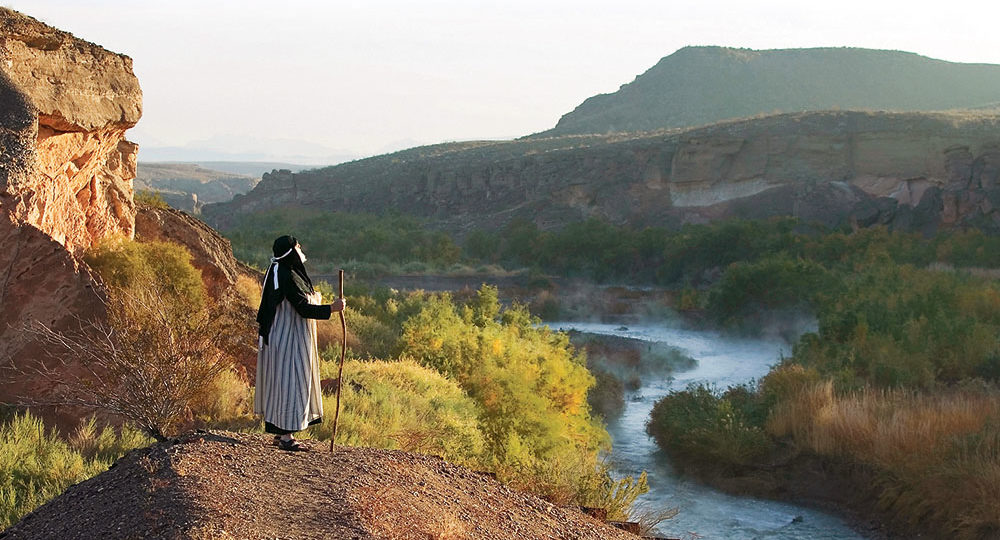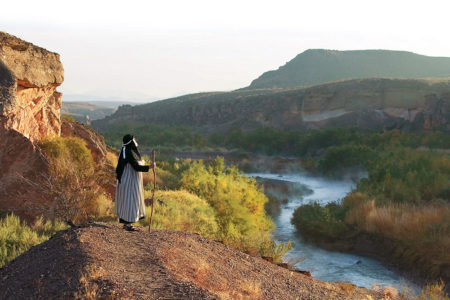The Seed of Abraham
Abraham—the very mention of his name stirs the hearts of multitudes of people the world over. Three religions, each spanning the globe, trace their origins back to him. To the great host of Muslims, he is their father, although he is not the founder of their religion. The Jewish people do consider him to be the founder of their faith. And Bible-believing Christians are blessed through Abraham’s seed, who is Christ (Gal. 3:13–16).
So, then, Islam, Judaism, and Christianity all lay claim to Abraham as their “father.”
Beginning with the inception of sin in the Garden of Eden, the spiral of humanity has been ever downward. From the seed of Adam sprang murder, corruption, and every kind of wickedness. In fact, mankind became so evil that God destroyed them by a universal flood, leaving only Noah and his family alive. And even Noah, after having experienced the grace of God in sparing his life, became drunk on one occasion after God’s judgment of the earth and was debauched by his family (Gen. 9:20–27).
After the flood, however, mankind still wanted to follow their own will and sought to approach God on their terms, causing God to come down, confound their language, and scatter them across the face of the earth. The promise of God, made in Genesis 3:15, to provide a Redeemer for mankind through the seed of the woman looked as if it would never be fulfilled. God and man appeared to be hopelessly separated. Was God finished with man? What hope was there for a world that was drifting farther and farther away from its Creator?
The Call of a Man
(Gen. 12:1)
Out of the midst of this decadent, sin-sick, downward-spiraling society, God called a man. God asked this man to trust Him by faith, while giving him only the barest of promises for the future. The Lord called him out of Ur of the Chaldeans, from the midst of an idolatrous people. Through this man would come a people, the promise of a land, and, most importantly, a seed through which God’s redemption would be provided. No, God had not forgotten His promise made in Genesis 3:15; He had not left mankind without hope; He would fulfill His promise to the world. God had not failed! Through this one lone figure, etched upon the history of humanity, would come the one who would fulfill all of God’s promises. Although the development of God’s plan of redemption would take centuries, Jehovah took a major step when He called Abram—or, as the Lord would later call him, Abraham.
The Call For Abraham To Leave His Homeland
(Gen. 12:1a)
“Now the LORD had said unto Abram, Get thee out of thy country.” Abraham was told to move out, to embark on a journey. But he was a Bedouin, a wanderer, accustomed to going wherever the grazing was best for his flocks. What, then, was so unusual about Abraham’s leaving his country? He probably did that regularly. We are given very few details concerning God’s call to Abraham, but we do know that he was obedient to that call. “So Abram departed, as the LORD had spoken unto him” (Gen. 12:4a).
It might appear from Genesis 11:31 that Terah, the father of Abraham, was the person whom God called. Apparently the Hebrew Scriptures record the account in this manner to pay respect to the elders, a very important custom 4,000 years ago in the culture from which Abraham came.
The biblical account, however, goes on to indicate that God called Abraham, not Terah. “And he said unto him [Abraham], I am the Lᴏʀᴅ who brought thee out of Ur of the Chaldeans to give thee this land to inherit it” (Gen. 15:7). This fact is further confirmed in the confession of the priests after the return from the Babylonian captivity and the reading of the Law by Ezra: “Thou art the LORD, the God who didst choose Abram, and broughtest him forth out of Ur of the Chaldeans, and gavest him the name of Abraham” (Neh. 9:7).
Abraham may have had to convince his wife Sarai that God had called them to leave their country. Hebrew names usually had a meaning that somehow fit the personality of the individual. Sarai means contentious, causing us to wonder if Abraham had difficulty getting his wife to leave her homeland. Although this is never mentioned in the Scriptures, it is possible that Terah and Lot went along to pacify Sarai.
God still calls His own people to serve Him today, and His call often means relocating to distant areas or even faraway lands. It involves a big step of faith to be obedient to the Lord’s leading. Many godly couples have had their ministries destroyed because one partner was reluctant to leave family, home, and familiar surroundings. Also, many parents have discouraged their children from serving the Lord in distant places. Are we willing to be obedient to the call of the Lord and go wherever He sends us? Are we willing to encourage our children to be obedient to the geographic will of God?
The Call of Abraham to Leave His Family
(Gen. 12:1b)
When the Lord summoned Abraham, not only did He tell him to leave his land, but to go “from thy kindred” (Gen. 12:1b). Abraham was only partially obedient to this part of God’s command. He left some of his family behind, but he took others with him, causing delay and complications. His father Terah went along (Gen. 11:31), as did his nephew Lot (Gen. 11:31; 12:5).
It is difficult to leave one’s family in obedience to the Lord, and this seemed to cause the greatest problem for Abraham and Sarai. The Lord had not called the rest of the family, and they consequently became a burden to Abraham. He was delayed for many years at Haran and could not fully obey the Lord’s command until after the death of Terah. God’s plan was for a people to come forth from Abraham, not to come with him. This call from God was meant to signify a new beginning for Abraham.
The Call of Abraham Unto a Land
(Gen. 12:1c)
God called Abraham “unto a land that I will show thee” (Gen. 12:1c). The patriarch did not have much to go on—only the promise of God that He wanted to show him a land: “go into the land of Canaan” (Gen. 11:31).
He was instructed to journey to a land that he evidently had never seen before, and he did not receive the promise that he would dwell permanently in that land until after he obeyed God, departed from Haran, and entered Canaan.
The Promise of a Nation and a Land
God did not give Abraham any specific details regarding the land to which He had directed him, nor did He indicate to whom this land ultimately would be given. Even if God had said at that time that He would give the land to Abraham and his posterity, Abraham would not have understood the divine promise because he had no children then. This must have troubled Abraham, especially as the years continued to pass and he and Sarai grew older.
The first indication that God had a plan for this area of Abraham’s life is recorded in Genesis 12:2a: “And I will make of thee a great nation.” The Lord covenanted with this dear patriarch that he would become the father of a great nation.
As the years slipped by and he and Sarai still had no children, Abraham thought that perhaps the great nation would come through his servant, Eliezer of Damascus (Gen. 15:2–3). The Lord, however, had other plans. He told Abraham that this great nation would come from his own loins—through a child born directly of his seed, even though he and his wife were far beyond the child-bearing years (Gen. 15:4). God further promised that Abraham’s descendants would be as numerous as the stars in the heavens (Gen. 15:5). And Abraham believed God’s promise (Gen. 15:6).
The years continued to roll by, however, and no child was born to Abraham and Sarai. Perhaps Abraham began to wonder if God meant that the seed would come through him, but not through Sarai. Sarai herself eventually suggested that Abraham take her Egyptian maid, Hagar, so that the promised heir could be born through her (Gen. 16:1–2). Soon Hagar conceived and bore Abraham a son, Ishmael (Gen. 16:11–16).
Ishmael was circumcised (Gen. 17:25), and God promised that he would be the father of twelve princes and would become a great nation. But God told Abraham that Ishmael was not the son of promise:
And as for Ishmael, I have heard thee: behold, I have blessed him, and will make him fruitful, and will multiply him exceedingly; twelve princes shall he beget, and I will make him a great nation. But my covenant will I establish with Isaac, whom Sarah shall bear unto thee at this set time in the next year (Gen. 17:20–21).
Not only did God reaffirm that the seed would be a child of faith, born long after Abraham and Sarah’s child-bearing years, but He instructed Abraham to name him Isaac and told him exactly when the child would be born. He was to be the seed who would fulfill the covenant of the Lord to the patriarch.
The Promise of the Land for a People
For hundreds of years a debate has raged concerning who has the biblical right of ownership of the land often called Palestine. Even today there is a great international dispute regarding Israel’s right to be a nation and have a homeland in that little spot on the eastern end of the Mediterranean Sea.
Does the land belong to the Jews as the result of the United Nations vote in November 1947? Does it belong to the Arab peoples? What about the Temple Mount—do the Jews or the Arabs have the right of possession? Should there be a West Bank, a Gaza Strip, a Golan Heights?
This territorial conflict originated with the birth of Ishmael and Isaac to Abraham, and the Scriptures give clear insights as to who has the biblical right of ownership of the land to which Abraham was called. Genesis 12:7 says, “And the Lᴏʀᴅ appeared unto Abram, and said, Unto thy seed will I give this land.” As the ancient sojourner traveled through the land, the Lord continued to deal with him about His generous real estate provision.
Following his separation from his nephew Lot, “the Lᴏʀᴅ said unto Abram … Lift up now thine eyes, and look from the place where thou art northward, and southward, and eastward, and westward, For all the land which thou seest, to thee will I give it, and to thy seed forever” (Gen. 13:14–15). In other words, Abraham’s seed would own the land forever.
Does this refer to Abraham’s seed through Ishmael or Isaac? The answer to this question is found in Genesis 15:7, where the Lord said to Abraham, “I am the Lᴏʀᴅ who brought thee out of Ur of the Chaldeans to give thee this land to inherit it.” Still unsure, Abraham asked God how he could know he would inherit the land (Gen. 15:8). God answered by “cutting” a blood covenant—the most solemn of all the Old Testament covenants, even more sure than those made with salt or a shoe—with Abraham. After Abraham completed the prescribed sacrifices and laid out the animal carcasses to be used in the covenant, the Lord caused a deep sleep to fall on him. While he was asleep, God walked between the pieces of the animals, confirming the covenant (Gen. 15:9–12, 17).
And he said unto Abram, Know of a surety that thy seed shall be a sojourner in a land that is not theirs, and shall serve them; and they shall afflict them four hundred years; And also that nation, whom they shall serve, will I judge: and afterward they shall come out with great substance. And thou shalt go to thy fathers in peace; thou shalt be buried in a good old age. But in the fourth generation they shall come here again; for the iniquity of the Amorites is not yet full … In the same day the Lᴏʀᴅ made a covenant with Abram, saying, Unto thy seed have I given this land, from the river of Egypt unto the great river, the river Euphrates (Gen. 15:13–16, 18).
God’s promises are very clear in this reiteration and detailing of the Abrahamic Covenant. First, the land of Canaan was given to the seed of Abraham. Second, the seed who would inherit the promised land would be in Egyptian bondage for 400 years. This is a clear indication that it is not the seed of Ishmael, but the seed of Isaac—Israel—who would be the biblical inheritors of the land.
Third, the exact boundaries of that land were given. Since Israel has yet to possess the land to the full extent of these boundaries, clearly there must be a day still future when she will do so. This is not a promise to be fulfilled to the Church, but a literal promise awaiting future fulfillment for the physical seed of Abraham.
Conclusions and Applications
At a time when the world had reached the depths of sin and degradation, God called Abraham, a man through whom he would forge a great nation. He promised Abraham a land and a seed, and through that promised seed He reached out to a lost and dying world, for it was from the seed of Abraham that God brought forth the one promised in Genesis 3:15, the one who would ultimately defeat Satan. This seed of Abraham, who came through Israel, is none other than the Messiah-Jesus.
By snatching one man out of an idolatrous society, giving him a land, and making of him a great nation, God took a major step in His plan for the redemption of mankind. The people and land of the Savior were identified.
Far more important than the question of who should possess the land of Israel is the question of whether we, as individuals, possess the Messiah-Jesus who, like Abraham’s son Isaac, became a willing sacrifice. Jesus paid the penalty for our sins at Calvary so that we may one day possess an eternal land.







Dear brother in Christ! May the bless and the grace of the Lord God in Christ Jesus be with you forever. I am a Hebrew (Naga), India have been silently preparing God’s plan for more than 40 years plus 7 years plus 40 days and 40 nights yet to be declared soon before the world and the universe for the glory of God and the Lord Jesus Christ through the seeds of our ancestors Abraham, Isaac andJacob (Israel). Surely, no longer the twelve tribes are going to gather together to fulfill the Scriptures through the Constitution of World Organization (yet to be declared ever first of its kind in the world from the first Adam to till date. Target for Head Office in Israel country through the will of God. You may be graceful for the head in the biggest continent, Asia. Praise be to God in Christ Jesus. Amen.✝️x